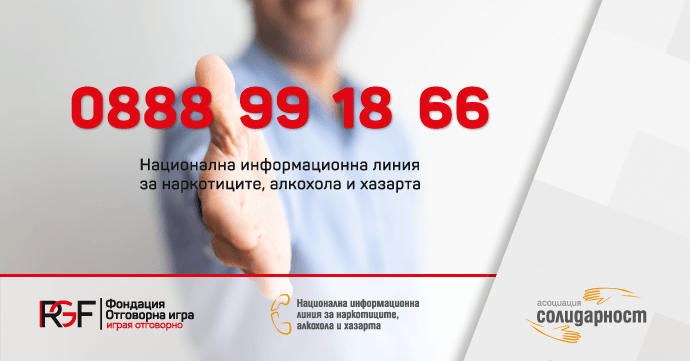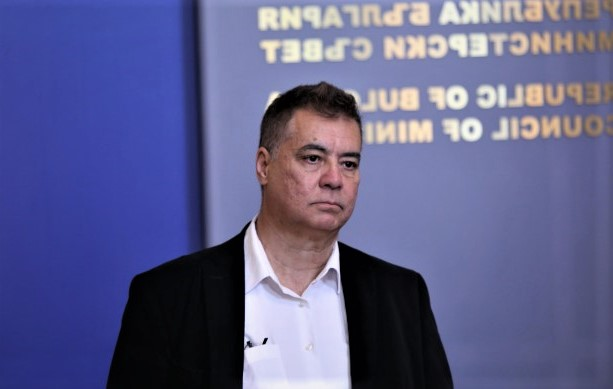Marina Popova is a psychologist at the “Solidarnost” Association for Rehabilitation of Addicted People – a nongovernmental organization, established in 2006. She has years of experience in the field of rehabilitation and resocialization of addicts. During this conversation she explains the benefits of the National Drugs, Alcohol and Gambling Helpline, which provides several different options for prevention and treatment.
– The Responsible Gaming Foundation funds the National Drugs, Alcohol and Gambling Helpline, and this is already leading to real results. How do you measure the public significance of the helpline?
Yes, to our delight, in 2022, the Responsible Gaming Foundation has decided to support the National Drugs, Alcohol and Gambling Helpline. Thanks to this cooperation, we managed to preserve it and till this day it continues to function. Before that, it was in real danger of being closed down. Its activity does not generate income and does not make any profit, which is why we need the financial support of partners. The helpline is the only anonymous and free service in Bulgaria that provides initial support and guidance to solve the problem of gaming addicts and their relatives. Contacting us is very easy – just call us, join our chat, or send us an email. There are no preconditions or restrictions on who can contact us.
Although our activities are mainly aimed at individuals within the territory of the country, we often need to consult people who are abroad. Their situation is often even more critical because not everyone speaks the local language fluently, and they have no way to seek help in the place they are. Thousands of people have contacted us over the years and hundreds of thousands have visited our site. The helpline is like first aid for people with a gambling problem who need support, initial counselling, information and referral for treatment. Therein, the helpline operation is truly of public importance, and we believe that we must preserve it at all costs.
Tell us a little bit more about how the hotline works?
We would like to clarify that, unfortunately, it is not a hotline. We are not able to work 24 hours a day, every day. For the moment, we manage to maintain working hours from 10 a.m. to 5 p.m. every working day. In these days and hours, people can contact consultants directly by phone or chat, and the rest of the time they can send emails with their questions.
The helpline was created in 2008 by the “Solidarnost” Association for Rehabilitation of Addicted Peolpe following the example of the long-existing similar helplines in most European countries, which number more than 50. The colleagues from one of the Dutch information lines trained us and gave us the model they work on. Our main activity is to provide anonymously and free of charge to the whole society extensive and reliable information and initial consultation about the effects and risks of drug and alcohol use, problem gaming, addictions and methods of their treatment, places of help in the country, as well as guidelines for parents, relatives and teachers.
– Based on your practice, what are the most common first signs of gaming addiction in our country and what is your advice to people who recognize its in themselves?
The first signs are often noticed by the family and relatives of the person who has a problem with gambling or addiction. Often, the addict is the last one who realizes that there is a problem. Relatives are also those who usually seek help first. When they call the line, usually things have already gotten out of control and there are some debts accumulated. The addict usually lies to conceal the scale of the problem, the frequency of his game and other negative consequences. Very often there are serious problems in the family as a result of the losses and lies. The workplace of the addict and the circle of friends are also suffering because of this type of behavior. We must not forget that addiction can also seriously affect people’s mental health. For example, many people tell us that they suffer from depression.
I would encourage anyone who is worried about himself or a loved one to seek help and advice on the helpline without delay and without fear of judgement. No one is immune to the development of a problem, but it is important to be consulted on time and not try to deal with it alone. Addiction is a serious disease that requires the intervention of specialists. The sooner the better.
– How do people with gaming addiction rank in the general picture of addictions in Bulgaria?
For a few years now, we have noticed that seeking help for gaming addiction has become an ever-growing trend. This is the reason why we began to deal more actively with this addiction – to provide more information to society and to the people in need, to try to attract the attention of politicians, institutions, and the media. But up to this point, the only ones who have responded are the representatives of the gambling industry.
There is also the problem of treatment possibilities, but that could be a topic for another conversation.
– Last year, together with the Responsible Gaming Foundation, you organized two trainings. What is your feedback and do you foresee other similar events this year?
Yes, at the end of September last year, the first training on the topic “First symptoms of gaming addiction in players at risk” took place. Techniques for interventions to reduce the risk of developing gaming addiction took place. Speakers were Svetoslav Kirilov, therapeutic director of “Solidarnost” and Marina Popova, psychologist of the helpline. The training was attended by over 50 people from the gambling industry, with the main goal was to improve their skills in recognizing the first signs of gaming addiction and discuss strategies for working with clients with problem gaming or people at risk of gaming addiction. In November, a master class followed, the purpose of which was to consolidate and upgrade the knowledge of the participants. The hosts of the event were Svetoslav Kirilov and Dilyana Bondokova, a psychologist in the “Solidarnost” program. The purpose of the joint work of the Association and the Foundation is to keep gambling within the realm of fun and enjoyment, rather than becoming a problem, with industry’s workers being the main ambassadors and collaborators of the mission. The participants were very active and interested and we hope to maintain the fruitful tone of cooperation.
In 2023, new trainings and joint events of the “Solidarnost” Association for Rehabilitation of Addicted Peolpe and Responsible Gaming Foundation are coming.





